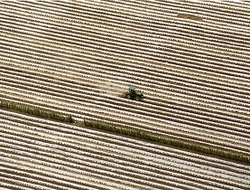
swissinfo.ch | 9 June 2011 | français
by Simon Bradley
Protestors have been demonstrating in Geneva against the growth in investments in agriculture that they say endangers food security in many developing countries.
The second “jetfin AGRO” conference for investors with an eye on agriculture and water took place in the western Swiss city on Tuesday. Meanwhile, the global land-grab phenomenon continues to expand as states attempt to regulate the issue.
Activists from some 25 Swiss non-governmental organisations and unions demonstrated outside the conference at the five-star Kempinski Hotel in Geneva against investments in agriculture and water in developing nations, which they say threaten people’s right to food and water and encourage speculation.
“We have to react against this new phenomenon where pension funds are investing massively in funds promoted by this conference,” said Margot Brogniart, coordinator for the coalition of protestors.
The fact that this is the third such meeting in Geneva in the space of a year, with others planned next week and in September, points to the growing interest by investors and Geneva’s major role, says Ester Wolf, a development specialist with the Bread for all NGO.
“Geneva is becoming a hub for such investments,” she told swissinfo.ch.
“Bright light”
The jetfin AGRO meeting brought together investors, wealth managers and commodity specialists from around the world to discuss strategies for agriculture, described as “the bright light of today’s investment universe”.
Topics included building an agro-business equity portfolio, hedging contracts for agro-investments, agricultural commodities and specific investment destinations such as India, Latin America and the US, as well as strategies for investing in timber and water.
Shaken by two food-price spikes in four years, countries from the Middle East, China, South Korea and elsewhere, concerned about feeding their own people, continue to invest heavily in farmland in places like Africa.
The recent financial crisis has pushed a second wave of private investors to diversify into agriculture.
“It’s a fashionable topic right now,” said Geneva wealth manager Philippe Szokolóczy-Syllaba, founder of My Global Advisor, who was present at the conference.
But investments in agriculture or specific projects remain very complex, he explained, as there is a race to find good quality land that is not too expensive and large financial outlays are needed.
Banks and funds
In Switzerland a number of banks, investment funds and firms are busy in this field, and many others are thought to be active behind the scenes.
In 2009 Credit Suisse and UBS participated in a share issue for Golden Agri-Resources, the world's second-largest palm oil plantation company based in Indonesia.
Private banks Sarasin and Pictet propose agro-related investments, and investment funds have been created in Switzerland, such as GlobalAgriCap in Zurich, GAIA World Agri Fund in Geneva and Man Investments in Pfäffikon.
Myret Zaki, deputy editor of the Swiss financial magazine Bilan, who attended the conference, said there was currently a huge demand to diversify investment portfolios.
“The yield potential from agro investments is not enormous – maybe ten to 20 per cent – and they can be volatile,” she told swissinfo.ch. “But people know that in the long term they can only but appreciate.”
Institutional investors like pension funds have been “disorientated” by recent events and are very open to new types of investments, says Zaki.
“What was formerly seen as exotic is now the norm,” she noted.
Swiss firms
Certain Swiss-based firms are also publicly active in major agriculture projects, such as Glencore, the world’s biggest commodities trader, which is said to own almost 300,000 hectares of farm land around the world.
In 2008 the Geneva-based firm Addax Bioenergy launched a high-profile sugarcane ethanol project on 10,000 hectares of land leased in Sierra Leone. It hopes to create more than 2,000 jobs when the project is fully operational in 2013.
“We need to have a much better idea who the Swiss firms are that are investing in agriculture abroad,” said Maya Graf, a Green Party MP.
She recently filed a series of parliamentary questions on the land-grab phenomenon, including one about how to best ensure investments comply with human rights in the countries concerned.
“Switzerland is actively committed so that the renewed public and private interest for investments in agriculture lead to a win-win solution for all sides,” said Swiss foreign ministry spokeswoman Carole Wälti.
It has also been supporting efforts to improve global regulatory mechanisms governing investment in land and natural resources, such as the “Voluntary Guidelines on the Responsible Governance of Tenure of Land and Other Natural Resources”.
Experts hope the text will be adopted during the next Committee on World Food Security in October 2011.
Simon Bradley, swissinfo.ch











